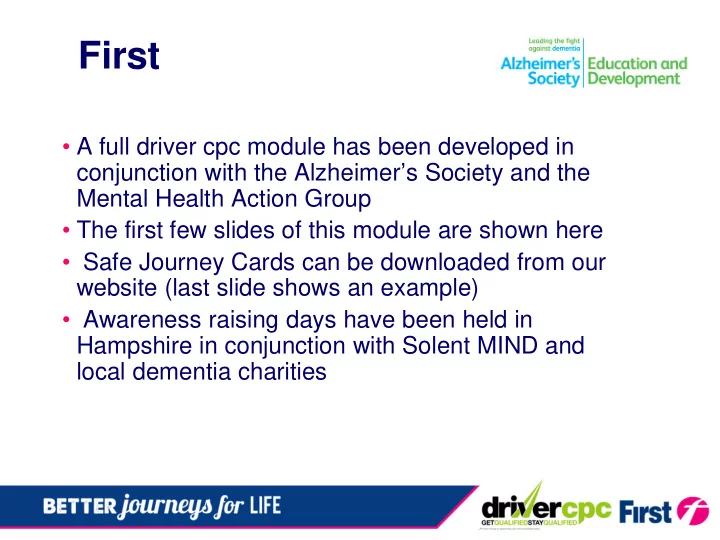

First • A full driver cpc module has been developed in conjunction with the Alzheimer’s Society and the Mental Health Action Group • The first few slides of this module are shown here • Safe Journey Cards can be downloaded from our website (last slide shows an example) • Awareness raising days have been held in Hampshire in conjunction with Solent MIND and local dementia charities
Introduction to Dementia For First Group
Memory Test
Solution
Aims • To recognise dementia as a range of different physical conditions. • To understand the link between physical damage to the brain and everyday skills and abilities • To give First Group drivers the knowledge and confidence to help a person with dementia use their bus service • To recognise our own responsibility in creating a dementia friendly community
Facts • There are currently over 800,000 people with dementia in the UK. • There are currently over 17,000 younger people (under 65) with dementia in the UK. • There are over 11,500 people with dementia from black and minority ethnic groups in the UK. • There will be over a million people with dementia by 2021.
Facts • 60,000 deaths a year are directly attributable to dementia. • The financial cost of dementia to the UK will be over £23 billion in 2012. • Family carers of people with dementia save the UK over £8 billion a year. • Two thirds of people with dementia live in the community while one third live in a care home. • Improving support for people with dementia goes beyond the vital role of the health and care system
What is dementia? • Dementia is not a natural part of ageing. • The term 'dementia' is used to describe the symptoms that occur when the brain is affected by specific diseases and conditions. • Dementia is progressive, • Each person is unique and will experience dementia in their own way.
What is dementia? • The connections in the brain deteriorate • Connections don’t get made • Messages don’t get through • Detours take longer
What are the symptoms? • Loss of memory • Confusion • Communication problems • Changes in emotional control or behaviour
How would you know someone may have dementia? • Confusion - Which stop they want (might just say “Home”) - Difficulty finding right money to pay - Day/date/time • Difficulty understanding you – and you them • Sudden unexpected outbursts – using abusive terms • No evidence of alcohol on breath
What causes dementia? There are several diseases and conditions that cause dementia. These include: • Alzheimer’s disease • Vascular dementia • Dementia with Lewy bodies • Fronto-temporal dementia (including Pick’s disease ).
The bookshelf model of memory storage Hippocampus memory Person with dementia • bookshelf wobbles • memories like books on a bookshelf • top shelf books affected first • stored over time • progressively lower books fall. • most recent on top. Moderate Dementia 60-75 45-60 30-45 15-39 0-15 Severe Dementia Mild Dementia
Communication – Hints and Tips • Make eye contact • Smile • KISS (Keep It Short and Simple) • Be aware of confusion - offer help • Be patient • Don’t contradict the reality of the person with dementia
customers with unseen needs our help can make the difference between 2 clear paths positive negative
Recommend
More recommend